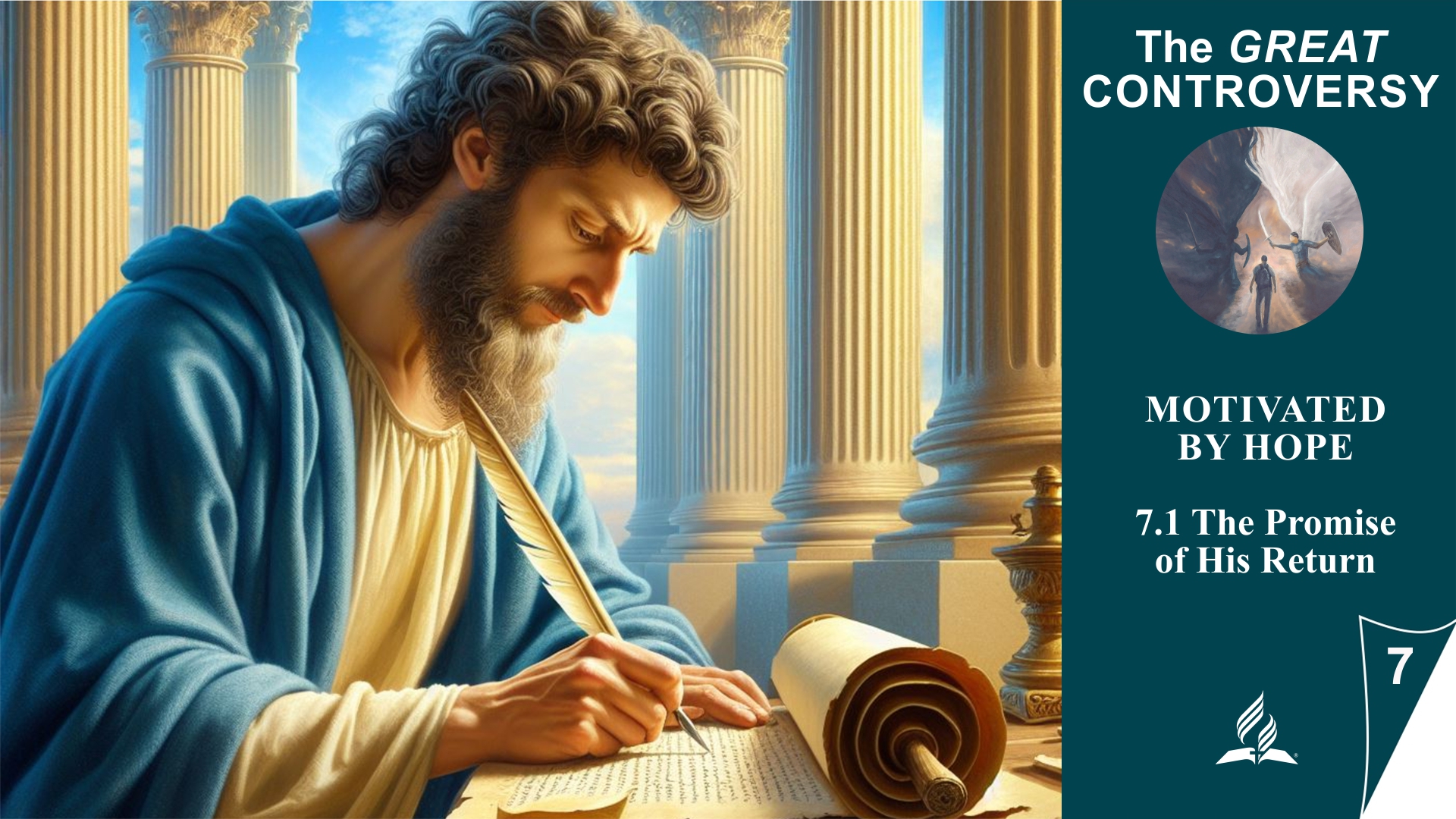


Lesson 7.Motivated by Hope
The Hope of Christ’s Return: Light in Dark Times
Motivated by Hope Hope of Christ’s Return: Light in Dark Times In Lesson 7, we embark on a fascinating journey through prophetic timelines, delving deeper into the mysteries and revelations of the Holy Scriptures. This lesson provides us with insight into the complexity and interconnectedness of various biblical prophecies, which have retained their significance through times and generations. Led by Daniel 8:14, we explore the chronology of prophecy, starting with the decree of King Artaxerxes of Persia in 457 BC, allowing the Israelite captives to return and rebuild the temple in Jerusalem. We trace the trajectory of these prophecies to significant events such as the baptism and public ministry of Jesus Christ, his crucifixion, and the fulfillment of the 70 weeks of prophecy. In doing so, we recognize how God’s actions throughout time have confirmed His promises and His sovereignty, while also testing the hearts of people and calling them to repentance and conversion. This lesson invites us to explore the prophetic statements of the Bible with an open heart and align our lives with God’s eternal plan.

7.1 The Promise of His Return
The Longed-for Hope: The Promise of Christ’s Return
The longing for the arrival of Jesus was a central drive for the Protestant reformers and the pilgrims who set sail from Holland to the New World. For them, the return of Christ was not a terror but a moment of joyful anticipation. Even John Wycliffe regarded Christ’s coming as the hope of the church, and Calvin spoke on behalf of many reformers when he referred to the glorious return of Christ as the most promising of all events. For faithful men and women of God, the coming of Christ was something to be longed for and welcomed with joy rather than feared.
Read John 14:1–3; 1 Thessalonians 4:13–18, and Titus 2:11–14. Why have these Bible passages given such hope to Christians throughout the centuries?
These Bible passages have given Christians hope throughout the centuries because they contain a promise of redemption and eternal life in Christ. John 14:1–3 speaks of the many dwelling places in the Father’s house and the preparation of a place for the believers, where they will be with Jesus. 1 Thessalonians 4:13–18 speaks of the hope of the resurrection of the dead and the gathering of the believers with the Lord in the air. Titus 2:11–14 emphasizes the blessedness of the believers in the anticipation of the appearance of the glory of Jesus Christ.
These Bible passages convey hope by promising a future free from suffering, death, poverty, injustice, and conflict. They promise a world of peace, happiness, and lasting communion with Christ and the redeemed. The return of Jesus is portrayed as the ultimate event of redemption and liberation from all evil. The hope of Christ’s return has given comfort and assurance to believers in difficult times. It reminds them that their suffering and trials are not permanent but that a glorious future of communion with Christ lies ahead. This hope has encouraged believers to remain steadfast in faith and to comfort and encourage one another as they await the fulfillment of God’s promises.
Why is Christ’s return so important for our faith? Why does this doctrine hold such significance, especially since we know that the dead sleep (see Lesson 10)? Why would we, as Paul says, be in a completely hopeless situation without it (see 1 Cor 15:15–18)?
The doctrine of Christ’s return is crucial for our faith for several reasons:
-
Fulfillment of Promises: Christ’s return is the fulfillment of the promises God has given to believers. It demonstrates that God keeps His word and completes His plans for redemption and the consummation of the world.
-
Hope of Redemption and Consummation: The doctrine of Christ’s return gives believers hope for final redemption and consummation. It shows that the suffering and toil of this world do not have the final say, but that a time of peace, joy, and communion with God lies ahead.
-
Justice and Judgment: Christ’s return is also understood as a time of judgment, where God will make all things right. For those who believe in Christ, this means the confirmation of their faithfulness and the reward of eternal life. For those who have turned away from Christ, it means facing God’s justice.
-
Completion of Communion with God: Christ’s return is seen as the moment of complete communion with God and all the redeemed. It is the time when believers will be with God forever, with no separation or sin between them.
The fact that the dead sleep, as mentioned in the Bible, does not change the significance of Christ’s return. On the contrary, it underscores the hope of the resurrection of the dead at His return, as clearly stated in 1 Thessalonians 4:13–18 and 1 Corinthians 15.
Without the doctrine of Christ’s return, Christians would be in a hopeless situation, as Paul emphasizes in 1 Corinthians 15:15–18. For without the certainty of resurrection and completion in Christ, their faith would be empty, and their lives would be without hope. Christ’s return is thus the foundation of the Christian faith and the source of hope for all believers.

Christ’s return is not just a theological doctrine but also has a direct impact on our daily lives and our faith:
-
Hope and Comfort: The prospect of Christ’s return gives us hope and comfort, especially in times of suffering, loss, and difficulty. It reminds us that our present troubles are temporary and that a time of peace and joy in Christ lies ahead.
-
Living in Expectation: The anticipation of Christ’s return motivates us to live a life centered on Christ. We live in hope of His return and strive to remain faithful to Him and to exemplify His kingdom on earth.
-
Responsibility and Mission: The doctrine of Christ’s return reminds us of our responsibility to spread the Gospel and build God’s kingdom on earth. We are called to be witnesses of Christ and to invite others to repentance and faith so that they too may share in the coming glory.
-
Patience and Endurance: The certainty of Christ’s return encourages us to be patient and enduring as we wait for the fulfillment of His promises. We know that God’s timing is perfect and that His kingdom will ultimately prevail, even as we face challenges in the present.
-
Ethical Living: The expectation of Christ’s return challenges us to live a life that aligns with the ethical and moral principles of the kingdom of God. We strive to practice justice, love, and mercy and to actively work for the good of others, knowing that one day we will stand before the judgment seat of Christ.
Overall, the doctrine of Christ’s return shapes our faith and our daily lives by giving us hope, motivation, responsibility, and direction. It reminds us that our earthly experiences and challenges are part of a larger divine plan and that ultimately Christ will be all in all.

The longed-for hope of Christ’s return gives us comfort in dark hours and fills us with confidence and joy as we look to the future.
Visited 89 times, 1 visit(s) today






